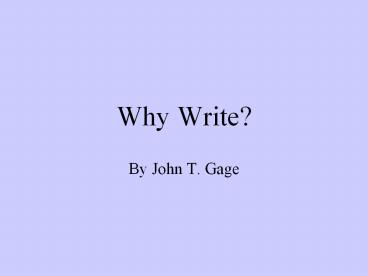Why Write? PowerPoint PPT Presentation
Title: Why Write?
1
Why Write?
- By John T. Gage
2
Bibliography
- From The Teaching of Writing, edited by Anthony
Petroskey and David Bartholomew, first published
in 1986 - Often referenced
- Commonly read in Freshman and introductory-level
composition courses
3
Biography
- Professor of English, University of Oregon
- Fields of research
- Rhetorical theory
- Composition pedagogy
- 20th century American poetry
4
Publications
- The Shape of Reason Argumentative Writing in
College - An Adequate Epistemology of Composition
Classical and Modern Perspectives - Rhetoric and Dialectic in Robert Frosts A Mask
of Reason
5
The Question
- Pedagogical inquiry
- If we assume the answer, we are in danger of
forgetting that justifications for writing depend
on different assumptions about what education is
for, and these will yield different pedagogies - Methodologies Ideologies
6
Discussthe following
- For what other reasons is this question of the
motivations behind writing important? Do the
reasons differ dependent upon the context? If so,
how and why?
7
Ancient Theories
8
Sophists
- From the Greek sophos, meaning wisdom
- Traveling teachers of various subjects
- Relativistic views of truth
- Conceived of rhetoric as epistemic
- Art that creates rather than reflects knowledge
9
Socrates
- Teacher of Plato
- Philosophy represented in Platos dialogues
- Viewed sophistic rhetoric as false art
- Absolute view of truth
- Dialectic in place of rhetoric
10
Aristotle
- Student of Plato
- Rhetoric(360-334 BCE)
- Positive aspects of rhetoric
- Creates community and goodwill
- Expository rather than dialogic
- Treats specific cases
- Relies on psychology as well as logic
11
Discuss the following
- What answers might we attribute to the ancient
Greek thinkers in response to the question why
write? Or, perhaps, in reference to certain
thinkers, why not write? How much validity do
these responses possess in terms of a
contemporary dialogue?
12
Contemporary Theories
13
Pedagogies
- Competency
- assumes that writing can be mastered by
learning what the attributes are and by
practicing them in exercises, apart from real
writing situations. - Process-approach
- emphasizes the stages of composing by offering
students procedures that will help them in
choosing topics, gathering information,
organizing their thoughts, composing and
revising.
14
Discuss the Following
- It is apparent in Gages discussion of these two
models that there is something inadequate in
their pedagogical approach. Outside of the
classroom, what effect do you think these
pedagogies might have on the writing students
will have to produce in the workplace, etc.?
15
Utility Vs. Responsibility
- Two primary questions
- If technical approaches to writing are justified
by the goal of competency, what justifies
competency as an end of education? - If competency is not a valid end of education,
and instead the idea garners primacy, what makes
an idea good?
16
Restructuring Pedagogical Approaches
17
Ideologies
- Relative nature of truth
- Writing as thinking-made-tangible
- Writing as process of discovering and structuring
ideas - Ethics
- Writing is the search, not only for the right
words in the right order, but for the right
reasons.
18
Pedagogical Reforms
- Writing class must be a place where students
encounter ideas and where they are free to
respond to them honestly and critically. - Students must know that they do not write
exclusively for the teacher. - Thoughtful revision should be taught as a
writers responsibility.
19
Discuss the following
- These pedagogical reforms fundamentally alter the
traditional approaches to teaching writing. How
do you think these pedagogical changes will
affect the writing done by students outside the
classroom?
20
So returning to our original question.
- Why Write?
21
Why write?
- ...because writing, more than any other task
brings one face to face with important human
responsibilities. These include the
responsibility to clarify and structure ones
ideas. More importantly, these include the
responsibility to continue the inquiry and argue,
toward the truth as we are able to discover it
through the shared means of discourse, even while
knowing that the whole truth will always be
beyond our means.

